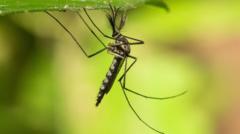Are Mosquitoes Making Their First Appearance in Iceland Due to Record Heat?

Published: 2025-10-22 06:00:20 | Category: world
The recent discovery of mosquitoes in Iceland marks a significant ecological event, as it is the first time these insects have been found in the country, which was previously one of the last mosquito-free havens in the world. The findings, attributed to unusually high temperatures this spring, raise concerns about potential impacts on local ecosystems and the future of Iceland’s delicate environment.
Last updated: 07 October 2023 (BST)
What’s happening now
Insect enthusiast Bjorn Hjaltason reported the first sightings of mosquitoes in Iceland last week, following a record-breaking heatwave that saw temperatures soar to unprecedented levels for the region. This discovery has drawn attention not only for its novelty but also for the implications it holds for the country's fragile ecosystem. Hjaltason's findings were confirmed by entomologist Matthías Alfreðsson from the Icelandic Institute of Natural History, who identified the insects as Culiseta annulata, a species capable of surviving winter conditions.
Key takeaways
- First recorded mosquitoes in Iceland, discovered after record heat.
- Species identified as Culiseta annulata, known for winter survival.
- Discovery raises ecological concerns for Iceland's unique environment.
Timeline: how we got here
Historically, Iceland has been one of the few regions free from mosquitoes, attributed to its cold climate and environmental conditions. Key milestones include:
- May 2023: Iceland experiences multiple record-high temperatures, exceeding 20°C (68°F) for ten consecutive days.
- Last week: Bjorn Hjaltason encounters mosquitoes in Kjós, near Reykjavik.
- Subsequent identification: Insects sent for confirmation at the Icelandic Institute of Natural History.
What’s new vs what’s known
New today/this week
The revelation that mosquitoes have been found in Iceland is unprecedented, particularly as it follows a period of extreme heat. This is a significant departure from the norm for a country that has largely remained free of such insects due to its climatic conditions.
What was already established
Prior to this discovery, Iceland was one of only two mosquito-free regions globally, with Antarctica being the other. The environmental factors that contributed to this status included the cold climate and lack of stagnant water for breeding, which are no longer as stable given the recent climate changes.
Impact for the UK
Consumers and households
While the immediate effects of the mosquito discovery in Iceland are geographically limited, they serve as a reminder for UK residents about the potential impacts of climate change on local ecosystems. Similar temperature rises could lead to changes in pest populations, affecting household comfort and safety.
Businesses and jobs
For businesses, particularly those in tourism and agriculture, the appearance of new pests can have implications for operations and pest management strategies. Increased monitoring and possible regulatory changes may arise if such trends continue.
Policy and regulation
The discovery may prompt discussions within the UK and devolved administrations regarding biodiversity and pest control policies, especially in light of changing climate patterns. Stakeholders may need to evaluate the readiness of existing frameworks to address new ecological challenges.
Numbers that matter
- 26.6°C: The highest temperature recorded in Iceland in May 2023.
- 10 consecutive days: Duration temperatures exceeded the typical high of 20°C.
- 2: Number of mosquito specimens found by Hjaltason (two females, one male).
Definitions and jargon buster
- Culiseta annulata: A species of mosquito known for its ability to survive in colder climates.
- Met Office: The United Kingdom's national weather service.
How to think about the next steps
Near term (0–4 weeks)
Monitoring efforts will be essential to determine if the mosquito population establishes itself. Local entomologists and wildlife bodies may increase surveillance in affected areas.
Medium term (1–6 months)
As the climate continues to change, further studies will be required to evaluate the ecological impacts of new species on local biodiversity. The situation may warrant reviews of pest management practices.
Signals to watch
- Any further reports of mosquitoes or other invasive species in Iceland and surrounding regions.
- Changes in local biodiversity and species population dynamics.
- Policy discussions regarding climate adaptation and pest control strategies within the UK.
Practical guidance
Do
- Stay informed about local biodiversity changes and climate impacts.
- Engage with local conservation efforts to monitor ecological shifts.
Don’t
- Ignore signs of changing pest populations in your area.
- Dismiss the potential impacts of climate change on local ecosystems.
Checklist
- Review local pest management guidelines.
- Participate in community monitoring initiatives.
- Stay updated on climate-related discussions in your local government.
Risks, caveats, and uncertainties
The emergence of mosquitoes in Iceland poses uncertainties regarding their potential impact on local wildlife and ecosystems. The long-term viability of their populations is unknown, and further research will be essential to assess how they might interact with native species and affect ecological balances.
Bottom line
The discovery of mosquitoes in Iceland represents a significant ecological shift, highlighting the urgent need for monitoring and management in the face of climate change. It serves as a warning of the potential impacts that warming temperatures can have on biodiversity, not just in Iceland but globally.
FAQs
Why are mosquitoes suddenly appearing in Iceland?
The appearance of mosquitoes in Iceland is attributed to record-breaking temperatures this spring, which have altered the environmental conditions that previously kept them at bay.
What species of mosquito has been found in Iceland?
The mosquito species identified in Iceland is Culiseta annulata, which is known for its ability to survive in colder climates.
What does this mean for Iceland's ecosystem?
The introduction of mosquitoes could disrupt local ecosystems, which have adapted to a cold climate, necessitating closer monitoring of biodiversity changes.



